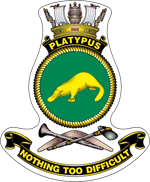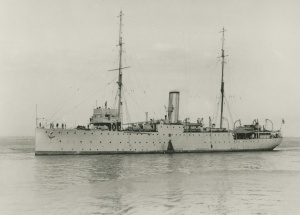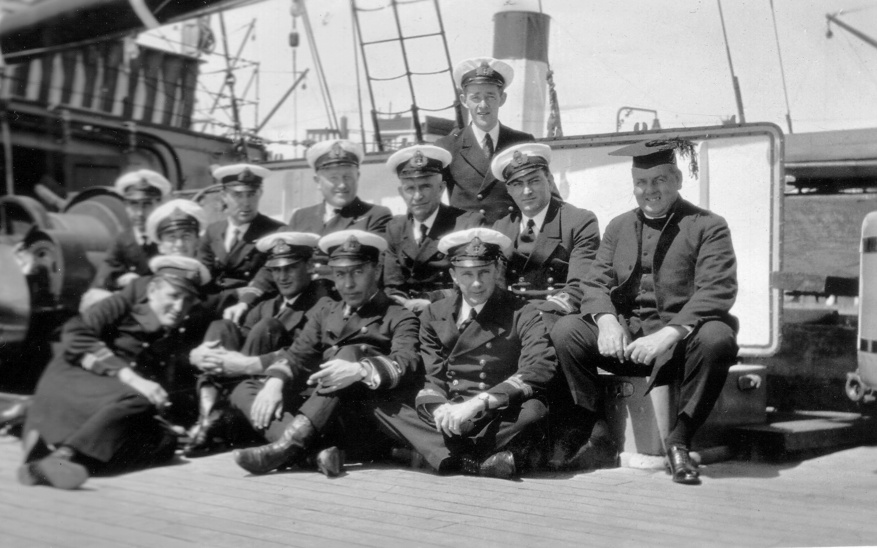HMAS Platypus (I)
| Type |
Submarine Depot Ship |
|---|---|
| Builder |
John Brown and Co Ltd, Clydebank, Scotland |
| Laid Down |
14 October 1914 |
| Launched |
28 October 1916 |
| Launched by |
Mrs Fisher, wife of the Australian High Commissioner to the United Kingdom |
| Commissioned |
25 March 1919 |
| Decommissioned |
1 November 1956 |
| Dimensions & Displacement | |
| Displacement | 3476 tons |
| Length | 325 feet |
| Beam | 44 feet |
| Draught | 15 feet 8 inches |
| Performance | |
| Speed | 15.5 knots |
| Propulsion | |
| Machinery | 2 sets of triple expansion reciprocating steam engines, twin screws |
| Armament | |
| Guns | 1 x 4.7-inch gun |
| Awards | |
| Battle Honours | DARWIN 1942-43 |

HMAS Platypus was built to the order of the Australian Government. After completion in March 1917 she passed to the control of the Admiralty until 25 March 1919 when she was commissioned into the Royal Australian Navy at Portsmouth, under the command of Commander Edward Boyle VC RN, as a Submarine Depot Ship for six J Class submarines transferred as a gift from the Admiralty to the Royal Australian Navy.
Platypus sailed from Portsmouth on 8 April 1919 and with the submarines in company proceeded to Australia via the Suez Canal, arriving in Sydney on 15 July 1919.
In February 1920 Platypus proceeded to Port Phillip where a Submarine Depot had been established at Geelong. In May 1922 the Naval Board decided to abandon the policy of maintaining a Royal Australian Navy Submarine Service. The three J Class boats remaining in commission were paid off, and on 1 July 1922 Platypus proceeded to Sydney. On 12 July at Sydney she paid off as a Submarine Depot Ship and on the following day recommissioned as a Destroyer Depot and Fleet Repair Ship. Operating with the Fleet, mainly in home waters, she served in this role until 1929.
Meanwhile, in 1924, a Five Year Naval Development Programme had been approved by the Australian Government, which included the re-establishment of a Royal Australian Navy Submarine Service with a flotilla of six boats.
Two Royal Navy Odin Class submarines were initially ordered. Named Otway (I) and Oxley (I), the submarines reached Sydney on 14 February 1929. Platypus returned to Sydney from a cruise in Queensland waters the following day. She paid off on 31 March 1929 to recommission in her former role as a Submarine Tender.
The reconstituted Royal Australian Navy Submarine Service suffered from the outset from the world wide naval retrenchments beginning in 1929. On 10 May 1930 Otway (I) and Oxley (I) were paid off into Immediate Reserve with provision for one day diving exercises per fortnight each boat. As a result it was decided to use Platypus as a Depot Ship at Garden Island, acting also as parent ship for the submarines.
Platypus paid off on 15 August 1929 and the following day commissioned as HMAS Penguin. In April 1931 Otway (I) and Oxley (I) were transferred to the Royal Navy.
Platypus continued in service as the Depot Ship at Garden Island, Sydney, under the name of Penguin until 26 February 1941 when she recommissioned as HMAS Platypus to resume seagoing service as a training ship.
In May 1941 she proceeded to Darwin. She was present in Darwin Harbour on 19 February 1942 when Japanese carrier borne aircraft made the first air attack on Australian soil. According to the official history of the Royal Australian Navy in World War II, ‘Platypus fought back hard, and though near-missed three times and with the lugger Mavie alongside her sunk escaped with damage in the engine room which immobilised her for some time.’
She remained in service as Base Ship, Darwin, until 1 January 1943 when she sailed for Cairns where she again served as Base Ship until May 1944.
At Williamstown, Victoria, on 12 June 1944, Platypus commenced a major refit and conversion of two of her four boilers to oil burning. The refit was completed in December 1944. On 5 January 1945 she left Sydney to proceed to New Guinea for service as a Repair and Maintenance Vessel.
Platypus operated in the Madang, Hollandia and Morotai areas until the end of November 1945, returning to Australian waters in December 1945. On 12 February 1946 she departed Melbourne for Sydney on her final sea voyage under her own power.
In April 1946 Platypus became the depot ship for ships in E Class Reserve, in Sydney. In this role the ship was the floating headquarters and workshop for the personnel monitoring the dozens of RAN ships no longer in service but held in reserve, in Sydney, pending re-activation or disposal. This role continued until the bulk of the wartime vessels had either been re-activated or sold for scrap. Platypus was finally decommissioned on 1 November 1956.
Platypus was sold on 20 February 1958 to Mitsubishi Shoji Kaisha Ltd, of Tokyo, Japan, for scrap. She was docked at Garden Island in April 1958 to ensure her hull was still sound and to have various equipment and fittings removed. In June 1958 the Japanese salvage vessel Tukoshima Maru departed Sydney for Japan with Platypus, and the former Bathurst Class minesweeper HMAS Dubbo (I), in tow. Upon arrival both ships were broken up for scrap.
Commanding Officers HMAS Platypus
|
Commander Edward Courtney Boyle, VC, RN |
25 March 1919 - 12 July 1922 |
|
Commander Maurice Baldwin Raymond Blackwood, DSO, RN |
13 July 1922 - 31 May 1923 |
|
Commander James Cantrell Johnstone Soutter, RN |
1 June 1923 - 13 January 1925 |
|
Acting Commander George Francis Langford, RAN |
14 January 1925 - 29 March 1925 |
|
Lieutenant Commander Reginald Warren Hore, DSC, RN |
30 March 1925 - 10 April 1925 |
|
Commander David Cranfurd Pillans, RN |
11 April 1925 - 17 July 1925 |
|
Lieutenant Commander Reginald Warren Hore, DSC, RN |
18 July 1925 - 3 September 1925 |
|
Commander David Cranfurd Pillans, RN |
4 September 1925 - 30 April 1927 |
|
Commander Rupert Clare Garsia, RAN |
1 May 1927 - 14 April 1928 |
|
Commander Harry Thring Bennett, DSO, RN |
15 April 1928 - 18 February 1929 |
|
Commander Alfred Gordon Hine, DSO, RN |
19 February 1929 - 15 August 1929 |
Decommissioned 15 August 1929. Recommissioned as Depot Ship HMAS Penguin 16 August 1929 - 25 February 1941
|
Commander Alfred Gordon Hine, DSO, RN |
16 August 1929 - 20 June 1930 |
|
Commander Rupert Clare Garsia, RAN |
21 June 1930 - 21 August 1932 |
|
Commander Ernest Clifford Rhodes, RAN |
22 August 1932 - 19 June 1934 |
|
Commander George Dunbar Moore, RAN |
20 June 1934 - 11 December 1935 |
|
Commander Ernest Clifford Rhodes, RAN |
12 December 1935 - 1 March 1936 |
|
Commander Hilary Dorsett Owen, RN |
2 March 1936 - 31 March 1938 |
|
Lieutenant Commander William Harold Thurlby, RAN |
1 April 1938 - 27 April 1938 |
|
Commander George Robert Deverell, RN |
28 April 1938 – 3 October 1939 |
|
Commander Alvord Sydney Rosenthal, RAN |
4 October 1939 - 26 October 1939 |
|
Commander Frederick Langton Cavaye, RAN |
27 October 1939 – 31 October 1940 |
| Acting Captain James Claude Durie Esdaile, OBE, ADC, RAN | 1 November 1940 - 25 February 1941 |
Recommissioned as HMAS Platypus 26 February 1941
|
Commander Harry Thring Bennett, DSO, RAN |
26 February 1941 - 11 December 1941 |
|
Acting Commander John Peter Tonkin, RAN |
12 December 1941 - 24 July 1942 |
|
Acting Commander Jack Donovan, RAN |
25 July 1942 - 26 March 1943 |
|
Acting Captain Ernest Clifford Rhodes, RAN |
27 March 1943 - 25 July 1943 |
|
Acting Commander Glen Loftus Cant, RAN |
26 July 1943 - 11 August 1944 |
|
Lieutenant Commander Desmond Aubrey Menlove, DSO, RANR |
12 August 1944 - 4 May 1945 |
|
Lieutenant Commander David Logan, RAN |
5 May 1945 - 19 January 1946 |
|
Lieutenant Commander Keith Francis Gibson, RANR |
20 January 1946 - 11 April 1946 |
As Depot Ship for Commanding Officer Reserve Ships (Sydney)
|
Commander Henry Hersee Palmer, RAN |
12 April 1946 - 2 September 1947 |
|
Acting Commander Robert Stephen Pearson, RAN |
3 September 1947 - 30 August 1949 |
|
Acting Commander Glen Loftus Cant, RAN |
31 August 1949 - 15 March 1953 |
|
Acting Commander Sydney Thomas Milton Gower, RAN |
16 March 1953 - 1 November 1956 |







